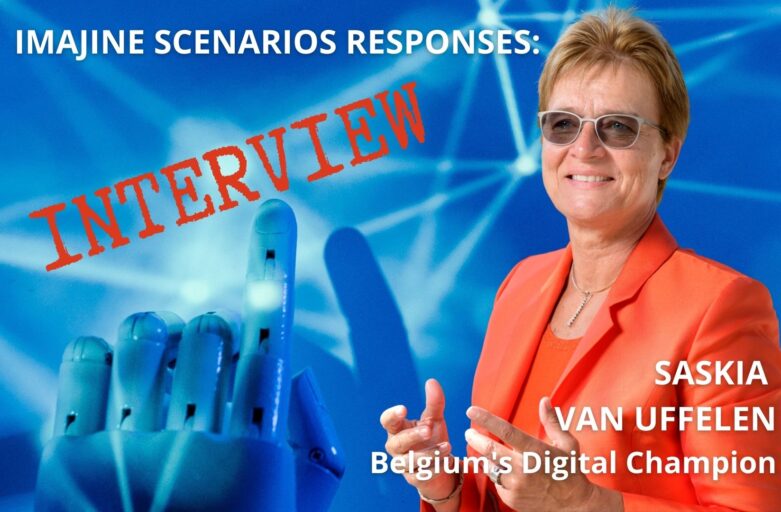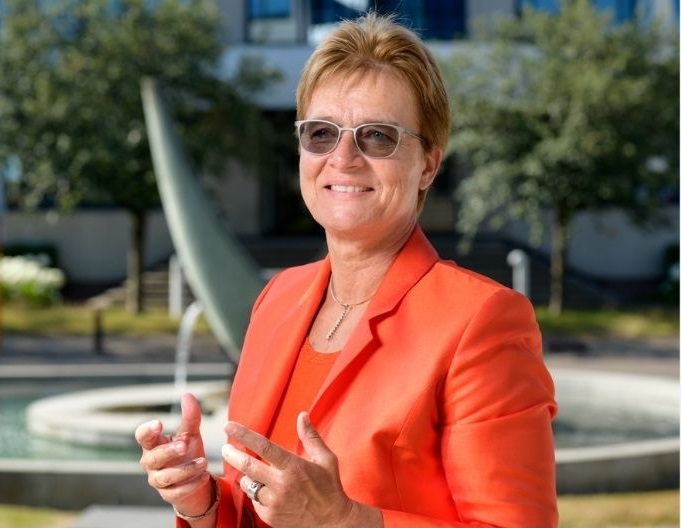Saskia Van Uffelen is the “Digital Champion” representing Belgium in the European Commission. In this role she helps to execute Belgium’s digital agenda for a fast, efficient, secure, and e-inclusive connected society. She works with industry, policymakers, institutions, and wider society, convening conversations which help to explore what needs to be done today to ensure good outcomes for coming generations. She spoke to Matt Finch for IMAJINE, offering responses to the project’s four scenarios for the future of European regional inequality in 2048.
M: What was your first response to the IMAJINE scenarios?
S: Happiness that this work has been done. If you need to take a decision, whether as a businessperson or a policymaker, you need to place your flag, to say where you want to head. 2048 seems a useful time horizon to me, because if you put the flag too close to the present, you will fall back to the same old reasons why something can’t work or can’t be done.
Going further is better, and daring to think out of the box, in all extremes. The scenarios do tend to focus, in my opinion, on the negative side of changes which might lie ahead, but of course there are also positives which we need to think about too. We don’t always communicate the positive reasons for change, and the opportunities enough.
M: Yes, this is definitely a challenge when devising scenarios to expose potential future inequalities! Each of our respondents sees the scenarios from a different perspective, and in different shades of light and dark. Hopefully you can highlight some of the opportunities and benefits which you perceive.
S: We have to be careful not to scare off policymakers, so that they say “No, it cannot work!” Or find sixty thousand reasons why something cannot work. Still, scenarios are done to stimulate out-of-the-box thinking: so there are not good or bad scenarios. We have to face things that seem very challenging, like aerospace industry scenarios describing a world in which international travel almost stopped: that seemed like something which should be put off the table a few years back, but then it happened during COVID!
The other thing I’m looking for in these scenarios is the balance which will be found after future crises.
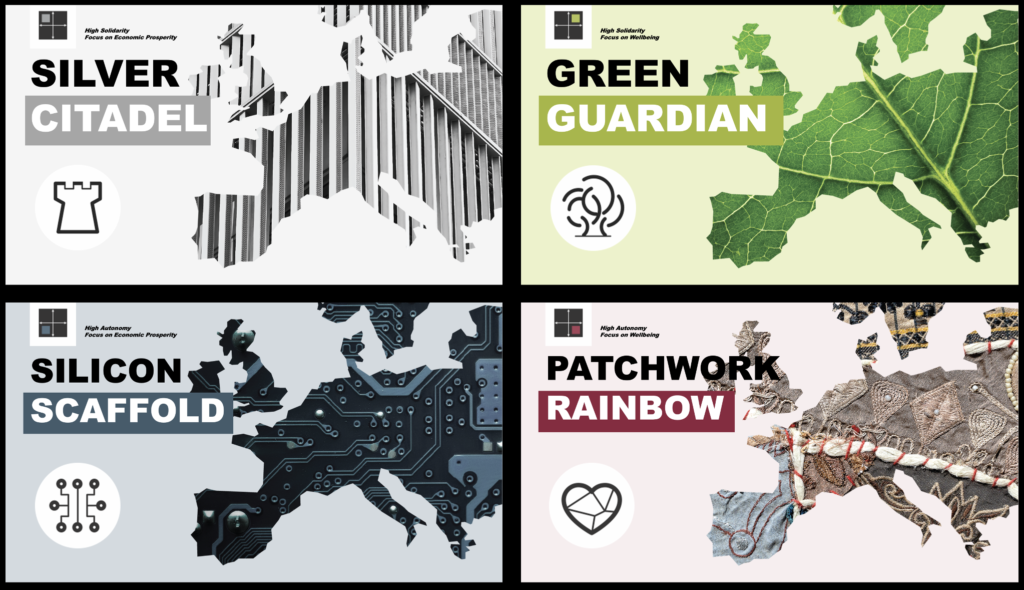
The PATCHWORK RAINBOW scenario, for example, feels like a set of extreme tensions which would have to be resolved. Perhaps we would have a war in the intervening years, but it would ultimately lead to a new balance. Our polarised black-and-white geopolitics will explode at a certain moment in time, and the question is: what comes after that explosion, when everything settles?
M: What’s your perspective on things like 5G conspiracy theories, the anti-vax movement, politically extreme philosophies that might shake popular faith in technology? Do they speak to this fundamental divergence of values which underpins the PATCHWORK RAINBOW?
S: Think of the microwave oven. There was a time we thought it was dangerous or bad for our health. I remember as a child, my parents wouldn’t let me watch television when I was ill, because the screen was thought to be dangerous. By the time we get to 7 or 8G technology, the time of these scenarios, there will still be people who are against everything, and fear everything – but that’s not the norm or the majority. Technology constantly evolves and people will also see the advantages. Again, it’s a question of education – and of explaining the positive aspects.
Some worries people have today about, say, personal privacy, don’t trouble me so much – I’m much more concerned about the next generation of infrastructure, and the geopolitics of that: who owns the technology on which the world runs, including harbours and other utilities as well as digital telecoms. This comes up across all of the scenarios, particularly with the rise of China in GREEN GUARDIAN.
Digital is only a technology, it is more like a language than an entity in its own right. In some parts of the PATCHWORK RAINBOW, we would see a shift to the sharing economy, and this would entirely change some of our understanding of inequality. The divisions of today would not necessarily be the divisions of tomorrow. And the IMAJINE scenarios which focus on wellbeing point us to the idea of exploring non-financial as well as financial measures of success.
M: Interestingly, one of the things which did go off the table in this project was the idea of military intervention in PATCHWORK RAINBOW: say, American peacekeepers being present in Europe in that scenario. This was a comment from one respondent on an early draft.
S: In that case, after such a moment, we would need ONE Europe. That it wouldn’t be an option any more, but a necessity: if we have a United States, why not a United Europe? A real crisis might engender that harmony, that cross-border collaboration, enabled by technology. Hopefully we do not have a war, but that would be one way that things balance out. We need to convince people, to point out the positive aspects, and keep people believing in the European project, to avoid this kind of crisis.
M: To some extent, that’s what the SILVER CITADEL scenario is about: Europe functioning as a single bloc, and a new European social model which has some strong Scandinavian influences.
S: You can certainly see how a sharing culture, a willingness to contribute, the tax pay distribution, can provide stability and a basis for progress. The sharing economy will cause a lot of changes, enabled rather than driven by technology.
The comments made by other scenario respondents about the future of the public sector were interesting, particularly those about the automation of government in some scenarios. Why would you need bureaucrats if you can regulate through technology?
M: I think of the OECD’s Rules as Code project, with machine-readable policies.
S: What will we do with the millions of people who currently work in the public sector if they are not needed, in a future where artificial intelligence or its successors can handle regulation? What competencies will they need? What tasks will need to be executed, the remaining roles which cannot be automated?
It’s frightening to think that SILVER CITADEL is the scenario we’ll end up with if we do not take decisions and just keep moving in the same direction: not solving a problem, not being truly disruptive, but just pulling on the elastic until it snaps.
M: In the very earliest drafts of the process, it was the “ghost scenario”, based on the current expectations and assumptions being made about the future which awaits.
S: We’ll end up with SILVER CITADEL, or at least with its stagnation, sooner than 2048 if we don’t act. And I don’t think we’ll see its positive aspects if we don’t embrace greater disruption.
It would be good to go deeper into the question of talent, in this scenario and the others: what education and skills will be needed in the Europe of tomorrow, and how does that relate to the labour market. Who will deliver it and how? This is something I’d like to know more about: the questions of skilling, upskilling, and re-skilling; what we do for the younger generation to prepare them for the future; how we ensure that the future for our children and grandchildren is one that we can be proud of.
I would like to see everyone have a validated open digital identity, like a digital ID card, which would represent their knowledge, competencies, and experiences. It’s not a question of privacy. Instead, every citizen makes this data open, and then it’s possible for me to sell myself in terms of using my individual competencies for particular tasks and challenges. Instead of employment by function – “I am a programmer or a CEO” – it would be by competency, drawing on the necessary skills from different combinations of people to achieve a set goal. But this would also require a different way of thinking about how we are paid, and what we are obliged to do, and how we balance working for competing interests.
SILVER CITADEL would require, as the scenarios point out, a completely unified tax and welfare system. But today, in 2022, we’re not discussing that. If that was on the table today, that could be a great opportunity. Technology could help us to build a fast, proactive, real-time welfare system. It would allow us to coordinate things like a pandemic strategy which went across borders, so you don’t have, as you do now, the Dutch fleeing their own lockdown and coming to us in Belgium. But the drastic decisions to get us there would have to be taken now, including taking e-inclusivity seriously.
Inclusivity is not just about culture, age, gender, it’s about getting everyone connected. Telecommunications decisions can’t be taken on a local, company-by-company, or street-by-street basis; and this goes for energy networks, too. We need to take decisions to ensure that the lights are still on in 2025, never mind 2048.
This kind of reform to tax and welfare would mean huge societal changes, the role of trade unions need to evolve to the current societal needs.
M: This question of unification of systems, and solidarity in policymaking, comes up also in GREEN GUARDIAN, where there’s a clear focus on new ideas of welfare and wellbeing, and new metrics apply too.
S: The rise of China is my concern there, and the question of democracy, which could be threatened in these scenarios. A Chinese-style politics might be very effective in some ways – it is easy to deal with dissenters! – but uncomfortable in terms of political accountability.
Yet we do need things to change; currently in Belgium we have democracy of a kind where, if just one person objects to installing a wind turbine in your area, we can’t progress. I’m not for dictatorship, but that isn’t democracy either. All these scenarios highlight that we need to redefine the world in terms of how decisions are taken collectively.
The economic model would also be of concern: with China already controlling harbours, infrastructure, key installations, what would be the economy of Europe in GREEN GUARDIAN? I like the aspect of looking at yield and fair share, and I am pleased that the EU is beginning to look at non-financials more and more, but it’s hard for me to see the economy of Europe in 2048, if China has become all-powerful.
There’s also a huge question, here and in other scenarios, about roles and responsibilities: the role of the public and the role of the private, the role of the employer and of the employee.
M: This question of balance keeps coming up. Whether it’s what individuals owe to institutions and vice versa, or the balance you’re suggesting between democratic accountability and ensuring that decisions which need to be taken can’t be held as political hostages.
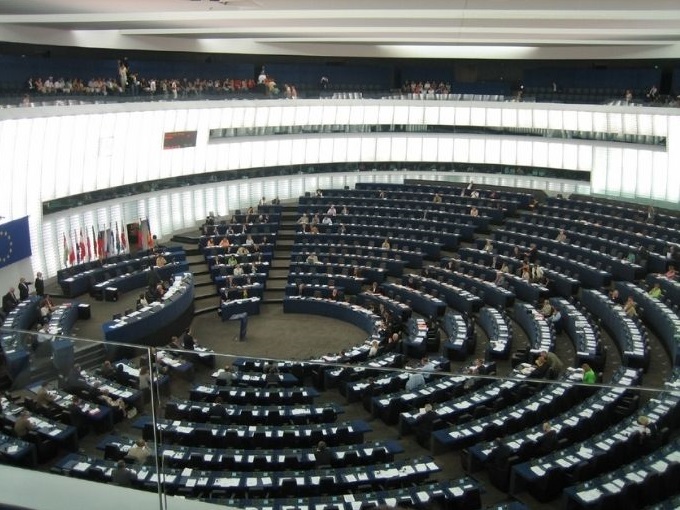
S: It comes back to my comments about an open digital identity for citizens, creating a sharing economy based on publicly shared skills and competencies. This is about a new balance between duties and rights: the obligations which link to our rights, and the commitments we must make to our society. The biggest USP for future Europe might be this: a connected, collaborative society and economy which can truly work together efficiently and innovatively. Europe then becomes an attractive place for the world to trade with, and a competitor not on price but quality.
M: Certainly you highlight the way all the levels are connected, from the global and geopolitical to the deeply local. I think of Lucas Kello’s book The Virtual Weapon and International Order. He talks about how historically we have given states sovereignty over physical jurisdictions, authorised their use of force and their right to collect taxes. Yet when we look to the digital domain, cyber competition and cyber security, he argues that we are seeing technology reduce the sovereignty of the nation state.
S: In 2022, we are still living in Napoleon’s world! And that’s frustrating.
We are talking about a flatter future world here, much like the flatter hierarchies you may find in organisations. You can only make the economy work if the playing field is adapted, and that might mean that you aren’t playing by rules and laws which we are still living by even though they were written in 1848.
M: The late Richard Normann talked about this, too: that in an increasingly networked world, geography matters, but perhaps not geography as defined by national boundaries and the vertical control logic of the nation-state. The question becomes, under new authorities: how do you protect citizens from exploitation?
S: I think this is a potential advantage of technology. Technology, based on the algorithm, on the one and zero, follows the rules as written. The power of the dashboard is that it highlights when given indicators are red, amber, or green. The responsibility for keeping indicators green is a shared responsibility, and such metrics will also help us to identify inequalities which are currently hidden under the table. An example: 40% of Belgians don’t have access to the technology which allows for online education. We could and should have known this, and faced it, earlier. The dashboard has the power to show us things, make us see things that were looked away from.
M: It comes to this question of which inequalities are measured, and even which ones are measurable. Who decides what the metrics are and what we are looking for in terms of red, amber, and green?
S: I think we will come to a new balance, and that the pandemic has been a huge accelerator towards that balance. Previously, the model was that the policymakers decide and the people have to follow; now, the bottom of the pyramid has been woken up and it is saying: “I don’t want to spend three hours a day, every day of my week, driving to and from work.” That becomes a red light for them, and it’s also possible that the balance will be more individualised.
That work-life balance, a phrase which I don’t like, it needn’t mean 50-50. It could mean 90-10 or 85-15 in one direction or the other. We need to trust the people and have the mechanisms in place to find the balance. Stop thinking we need to define one-size-fits-all; maybe it’s the citizens’ job to define red, amber, and orange, and to find ways to make them align collectively as well as individually.
M: Your use of the word “trust” highlights for me why PATCHWORK RAINBOW has been such a challenging scenario in this discussion, because really the failure to maintain trust around certain key values across the regions of the EU is a defining characteristic of that scenario.
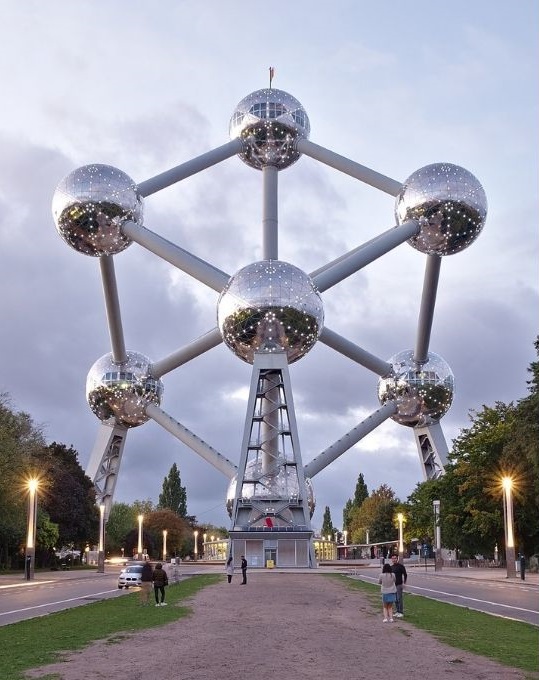
source: Trougnouf (Benoit Brummer), CC BY 4.0 https://creativecommons.org/licenses/by/4.0, via Wikimedia Commons
All of this brings us to SILICON SCAFFOLD, which for many respondents has highlighted some challenges, but I suspect you see some opportunities in this future.
S: The scenario is written to emphasise the extremes of inequality, but ultimately, it is: “Everything which can be automated should be automated.” And this is how things should be! People will have other things to do, as the demographics shift, we will need technology to free up humans, train them to deal with the issues which cannot be automated, and put them in place to do that work.
This might even mean changes to the emergency services. I had conversations with the Belgian police some time back and we were considering their future role. Historically, their responsibility was control and safety, and there was a public respect for the hierarchy they represented. And in emergencies, you might have three cars all going to the same incident: the police, the fire brigade, and the ambulance.
But what if they started to work in a transversal way – not with three hierarchies, each with their own budgetary pressures, but perhaps collaborating? This could start today. It might even mean that their roles were not the responsibility of the public sector any more. There are already private organizations which offer some of these competencies, some of which have arisen as a result of dissatisfaction with the public service offer. It’s a solution to our talent shortages: to reorganize the world in a completely different way. With a great deal of the public sector automated, and the remaining part delivered by some end-to-end solution providers.
Again, it’s much like some of my experience in organisations: the focus was growth above all, and the business lines did not really talk to one another. Now, companies who’ve recognised that doesn’t work anymore have moved to a transversal model. SILICON SCAFFOLD is a future where Europe has moved to a transversal model. Think of the EU as a big organisation, with the ability to work and share talents across borders, jurisdictions, institutional boundaries.
M: It makes me think of Normann and Ramírez’s idea of density and liquidity in networks: density in terms of how many activities can be done efficiently from a single point, as in the way that your phone can now do the job of a camera, audio recorder, word processor, calculator, web browser, step counter, bank card, and so on; liquidity in terms of how easy it is for information and assets to flow.
S: In such a Europe, good solutions can be developed end-to-end and the approaches which prove effective can be used across the network. The skills and expertise and competencies which are needed, wherever their owners are geographically, can be used where they are needed. One transversal offering that can be brought to all European citizens. On questions of energy, this will be especially important, I think: to ensure that solutions for the energy network are devised for Europe as a whole, not on a nation-by-nation basis.
M: Again, does it come to the idea that trust and solidarity are needed for this transversality to apply?
S: That’s already difficult for an organisation. For Europe, it’s a huge job and a lot of rethinking needs to be done. For example, thinking about talent in terms of output rather than physical presence or hours worked. But, for me, SILICON SCAFFOLD is disruptive but appealing.
I’d say that SILVER CITADEL will do nothing for us, GREEN GUARDIAN boils down for me to “the light has gone out and the Chinese have taken over”, PATCHWORK RAINBOW I don’t even want to discuss further – whereas SILICON SCAFFOLD, seen in a positive light, will have the aspects of success and e-inclusivity which are fundamental, I believe, to our survival.
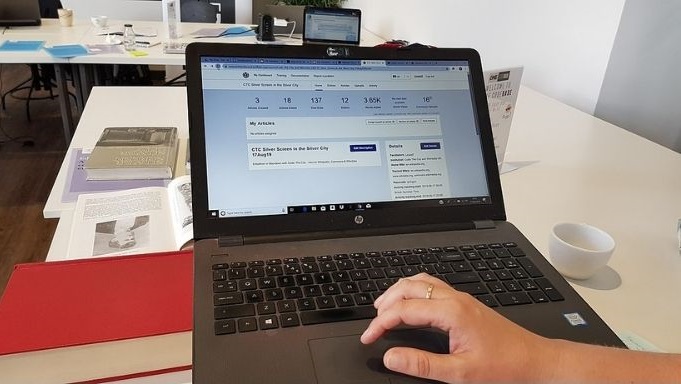
source: Watty62, CC BY-SA 4.0 https://creativecommons.org/licenses/by-sa/4.0, via Wikimedia Commons
I believe that we need a drastic rewrite of the rules of the game, and that the work of redefining those new rules can be bottom-up and creative. If you’ve seen youngsters participating in a hackathon, there’s no reason not to ask: why shouldn’t we define regulations based on that kind of process?

